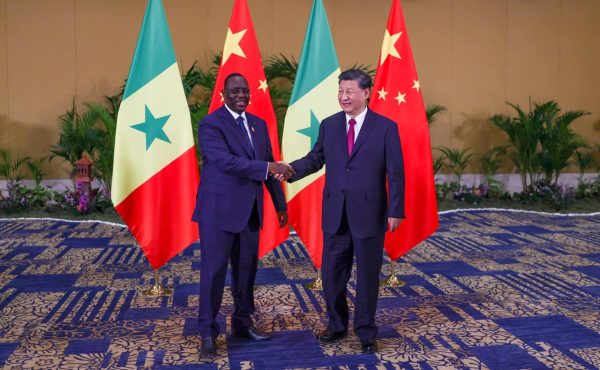
Chinese President Xi Jinping held 11 formal sit-downs with foreign leaders on the sidelines of the G-20 summit in Bali, Indonesia. Most famously, he had his first face-to-face meeting with U.S. President Joe Biden. But one meeting was largely overshadowed during the diplomatic flurry: Xi’s summit with Senegal’s President Macky Sall, who was invited to the G-20 summit as a guest in his capacity as the current chair of the African Union (AU).
Sall’s presence in Bali gave Xi a chance to make up for lost time. Senegal hosted the Forum on China-Africa Cooperation (FOCAC) from November 29-30, 2021. Generally, the triennial event is a leaders’ summit, and under ordinary circumstances Xi would have been in attendance. However, 2021 was far from “ordinary” for Chinese diplomacy.
China’s strict COVID-19 protocols kept Xi from leaving China from January 2020 to September 2022. The FOCAC meeting in Senegal was downgraded to a ministerial conference as a result. But on November 15, nearly a year after the missed opportunity at FOCAC, Xi was finally able to shake Sall’s hand – albeit on Indonesian soil.
Both Xi and Sall were keen to praise cooperation between their specific countries, as well as between China and the African continent writ large.
“China will continue to follow the principle of sincerity, real results, amity and good faith and the principle of pursuing the greater good and shared interests, and enhance solidarity and cooperation with Senegal and other African countries, to jointly build a China-Africa community with a shared future in the new era,” Xi declared, according to the Chinese readout.
Xi also promised to continue to support infrastructure projects in Senegal, despite perceptions that China’s cash flow to the developing world is being cut off. “China will continue to support Senegal in building infrastructure such as roads and industrial parks,” Xi pledged, while also promised to “expand the import of agricultural products from Senegal.” Those twin concerns – ensuring continued Chinese funding for infrastructure and industrialization and boosting exports to China – are major priorities for many African leaders in their dealings with China (see also Tanzanian President Samia Suluhu Hassan’s visit to China from November 2 to 4).
In the diplomatic realm, Xi also noted that “China and Senegal hold highly aligned positions on major issues such as safeguarding world peace and promoting common development. China will work in solidarity and coordination with Senegal to jointly uphold international fairness and justice and the common interests of developing countries.”
Along those lines, Xi reiterated China’s support for the AU to join the G-20, not only in his meeting with Sall but also in his remarks to the whole G-20 summit. That followed up on a similar expression of support made by Chinese Foreign Minister Wang Yi in August.
South Africa is currently the only member of the G-20 from Africa, but the AU has been seeking a seat for itself, pointing to the European Union’s membership as precedent. The AU, as well as individual African countries, renewed the push for AU membership this year, and were rewarded by new expressions of support – and not just from China. Sall was in Bali in the first place because G-20 president and host Indonesia invited him to attend as the AU’s current chair. European Council President Charles Michel has also given the EU’s support.
Pushing for the AU’s inclusion in the G-20 has both ideological and practical benefits for Beijing. Ideologically, it matches well with China’s rhetoric about promoting a more “democratic” world order, one that gives more voice to the developing world. In a more pragmatic sense, increased representation for the AU would translate to more support for China on its major issues of concern.
For an example, take the contentious issue of China’s human rights abuses against the Uyghurs and other Turkic ethnic groups in Xinjiang. In the West, rights groups and governments alike have denounced China’s mass detentions and oppressive surveillance in Xinjiang as crimes against humanity. In response, Beijing has rallied its own supporters – many of them African countries – to counter the accusations.
A recent proposal to hold a “debate on the situation of human rights in the Xinjiang Uyghur Autonomous Region, China” at the U.N. Human Rights Council was narrowly defeated in large part due to African countries’ support for China’s position. The final tally was 17 votes in favor, 19 against, and 11 abstaining. Of the 17 countries in favor, only one (Somalia) was African. Of the 19 countries voting to shield China from scrutiny, eight were African: Cameroon, Cote d’Ivoire, Eritrea, Gabon, Mauritania, Namibia, Senegal, and Sudan. Another four African countries – Benin, Gambia, Libya, and Malawi – abstained.
China finds support on Xinjiang and other issues from African counties both because of its longstanding diplomatic and economic involvement on the continent, and because many African nations are deeply wary of Western-led campaigns to denounce human rights violations (at times, it must be said, because governments backing China are guilty of their own atrocities).
Wang Yi spoke of this dynamic back in August, at a FOCAC Coordinator’s Meeting. “In the face of the various forms of hegemonic and bullying practices, China and Africa have stood with each other shoulder to shoulder,” Wang declared.
It’s no coincidence that Wang offered China’s support for the AU to join the G-20 at the same meeting. Likewise, right after praising Xi’s decision to back the AU, Senegal’s president essentially offered Xinjiang up as a tit-for-tat: “African countries’ firm support for China in Xinjiang-related issues fully demonstrates the high-quality mutual trust and high-level of relations between Africa and China,” Sall declared.
Don’t Overlook Xi Jinping’s Meeting With Senegal’s President
Source: Frappler

0 Comments